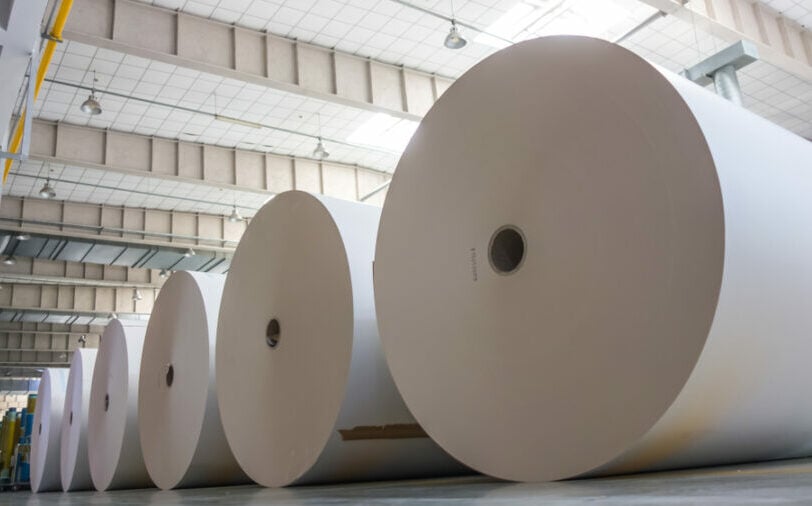We still use paper for many purposes all over the world despite entering the digital era. The total global production of paper and board exceeds 400 million tons each year, according to STATISTA.
Environmental effects
But paper production has negative environmental impacts on the planet, including desertification as a result of cutting down trees, which are important elements in absorbing carbon dioxide, in addition to endangering biodiversity and creating air pollution.
In addition, the pulp industry is the fifth largest consumer of energy, consuming 4 percent of the world’s total energy use.
But most importantly, paper production results in a large amount of solid waste, as this material constitutes about 26 percent of the total.
The concept of e-government
These terrifying facts and figures motivated the Gulf Cooperation Council countries to proceed with the digital transformation that is taking place at the global level, and to establish the concept of e-government, which helps reduce the consumption of paper products.
This policy has paid off, as these countries topped the e- and mobile government services maturity index for the year 2021, according to ESCWA, where Saudi Arabia, the UAE, and Qatar came in the first three ranks.
Saudi Arabia
Saudi Arabia is one of the leading countries in this field. Advanced digital infrastructure in the Kingdom has contributed to accelerating the process of digital transformation in it.
There are many electronic services provided by government agencies, which are used by thousands of citizens daily.
The government’s interest in the importance of digital transformation in all its government services coincided with joint cooperation between ministries to activate e-governance in light of the “Kingdom’s Vision 2030” and work to improve the efficiency and sustainability of services.
It has established an integrated “Yesser” platform that includes all government agencies to exchange government correspondence and documents in a safe, easy, and high-quality electronic manner that saves time, effort, and cost in order to reach the concept of “paperless government”.
UAE
When the UAE launched the “smart government” initiative, the country’s Vice President, Prime Minister and Ruler of Dubai, Sheikh Mohammed bin Rashid Al Maktoum, said at the time that “a successful government is one that goes to people and does not wait for them to come to it.”
This argument has become a reality today and is confirmed on the ground after the development of government digitization, and then the implementation of the “Dubai Paperless Strategy”, which made the Dubai government the first “paperless” government in the world.
Today, all internal and external transactions and procedures in the Dubai government are fully digital and are managed through comprehensive digital government service platforms.
The Dubai Paperless Strategy aims to employ advanced technology to build an integrated system for paperless government work.
And it contributed to eliminating the use of more than 336 million papers that were used to complete transactions.
It also saved more than 1.3 billion dirhams, in addition to more than 14 million hours at the government level.
Recently, two government entities joined the “Dubai Paperless Strategy”, namely the Dubai Financial Supervisory Authority and the Dubai Chamber.
In this context, the Dubai Chamber of Commerce recently revealed that it obtained the “100% paperless” stamp from the Dubai Digital Authority after its commitment to implement the “Dubai Paperless Strategy”.
It dispensed with about 37 million sheets of paper, which is its total consumption of printed papers during this period, and rid itself of 49 printing machines in the rooms.
It should be noted that the Chamber provides more than 50 smart main services, and has become a pioneering model in digital transformation, and enjoys advanced digital infrastructure with high efficiency that meets all the requirements of the private sector and the business community.
Qatar
As for Qatar, it has become one of the most advanced countries in the field of digitization and the shift towards modern technology, in line with the “Qatar Vision 2030”, which helped in a significant decline in paper consumption.
The Qatar Digital Government Program includes more than 1,200 digital services.
Citizens, residents, and workers in Qatar benefit from electronic access to more than 400 services, 150 of which can be accomplished completely electronically.
Other sectors
In addition to the public sector, other sectors have contributed to reducing paper consumption in order to save the environment, especially after the spread of Corona.
For example, when several companies adopted “hybrid work” or “remote work” systems, the consumption of paper such as documents, contracts, and others decreased.
Around 83 percent of companies in the UAE support hybrid work practices, according to a new report issued by “Cisco.
In schooling, e-learning has helped reduce paper consumption and recently the UAE Ministry of Education allocated an electronic store for students that contains textbooks and education resources, where students can open an account on the store and view the curricula and the latest textbooks.








